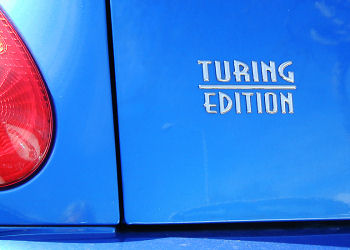 |
|
Call Me Maybe (video)
|
|
Monday, April 10 12:00 AM ET |
Chrysler's "Smart Car" Hailed as Latest Step in Man-Machine SymbiosisBy Paul Marcus |
||
|
Detroit , MI - With automobiles increasingly controlled by ever-more sophisticated computers, it was practically inevitable that they would take over a larger and larger share of overall decision-making from the car's occupants (formerly referred-to as "drivers" and "passengers"), at what is now clearly a rapidly accelerating rate.
"We know our target market for this model consists mainly of people who want to present the appearance of living a youthful, hip lifestyle, but who lack the resources or, more typically, the dedication and will-power it takes to actually eat right and exercise," says Chrysler Vice President of Sales Seymour Marks from his seventh-story offices, located in Los Angeles' aptly-named Miracle Mile district. "By applying purely rational algorithms, this car can easily and painlessly make many of the most emotionally-charged decisions for them, relieving so many of the pressures they feel that ... why, I personally know customers who were able to discontinue all medications after just a few weeks of driving their new car." For example, in a mechanism which has drawn both criticism from the U.S. Chamber of Commerce and plaudits from the American Diabetic Association, mass-sensors in the seats maintain a constantly-updated record of the occupants' weight and body shape. If the car detects a gain of greater than three pounds (two pounds if concentrated in the buttocks area), it locks the doors, and will not allow anyone to get out if parked within two blocks of a Krispy Kreme® store -- an operation made possible by the use of GPS technology in conjunction with an exclusive licensing arrangement with MapQuest®. ( Note: This particular feature is disabled on fleet units sold for use as police undercover vehicles or taxicabs.) In an analogous fashion, the car will slow down and play disco music if driven within 800 feet of a health club, spa, or other recreational facility, while simultaneously administering mild, rhythmic electric "impulses" to the back and leg muscles to "exercise" them, utilizing equipment adapted from medical devices originally used in the rehabilitation of victims of spinal cord injuries, some 78% of which occur -- perhaps ironically -- in automobile accidents. These new technologies have apparently infiltrated the automotive industry with relatively little resistance over the past few years, primarily in the guise of safety features, such as the gadgets which automatically measure the driver's blood-alcohol concentration, and which then prevent the car from starting if that BAC exceeds the local legal limit.
Japanese and German automakers have so far managed to avoid public comment on this new trend, though some respected industry analysts suspect that their silence may indicate only that they simply don't feel that the automobile business is "a cost-effective vehicle" (sic) for managing the behavior of large populations, preferring instead to route that aspect of their operational strategy through their tested and proven consumer electronics subsidiaries. In an unrelated announcement, a representative of the National Security Agency -- reading from a prepared statement -- said he could neither confirm nor deny that the Agency routinely accesses OnStar®'s real-time database of vehicle location/navigational data, while noting that terrorists' overwhelming preference for foreign models would make such tracking of citizens' movements "an obviously monumental waste of government time and money, and don't even mention the civil liberties implications."
|
Warning: Undefined variable $HTTP_SERVER_VARS in /home/bbspot/public_html/cgibin/prev_next_links.php on line 3
Warning: Trying to access array offset on value of type null in /home/bbspot/public_html/cgibin/prev_next_links.php on line 3
Warning: include_once(/work/php_mgr/sql.inc): Failed to open stream: No such file or directory in /home/bbspot/public_html/cgibin/prev_next_links.php on line 3
Warning: include_once(): Failed opening '/work/php_mgr/sql.inc' for inclusion (include_path='.:/opt/cpanel/ea-php80/root/usr/share/pear') in /home/bbspot/public_html/cgibin/prev_next_links.php on line 3
Warning: Undefined variable $db in /home/bbspot/public_html/cgibin/prev_next_links.php on line 5
Fatal error: Uncaught Error: Call to a member function qstr() on null in /home/bbspot/public_html/cgibin/prev_next_links.php:5 Stack trace: #0 {main} thrown in /home/bbspot/public_html/cgibin/prev_next_links.php on line 5


 Significant advances in the manufacture of low-cost sensors, combined with a massive outsourcing of AI (Automotive Intelligence) programming, have together enabled the subtle but swift (by U.S. industrial standards) incorporation of several behavior-modifying systems into the everyday operation of consumer-driven automobiles. Perhaps the most archetypical current example is the new PT Cruiser "Turing Edition," which was recently unveiled at the 2006 New York Auto Show.
Significant advances in the manufacture of low-cost sensors, combined with a massive outsourcing of AI (Automotive Intelligence) programming, have together enabled the subtle but swift (by U.S. industrial standards) incorporation of several behavior-modifying systems into the everyday operation of consumer-driven automobiles. Perhaps the most archetypical current example is the new PT Cruiser "Turing Edition," which was recently unveiled at the 2006 New York Auto Show.